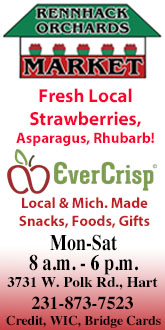By Rob Alway
Editor-in-Chief.
AMBER TWP. — Every year tourists flock to the Ludington area to spend time on its beautiful Lake Michigan beaches. But, Mason County offers far more to tourists than just its beaches. The area’s agriculture industry is also a prime target for tourists who want to have an cultural tourism experience. An agri-tourism presentation was held Thursday night at Mason County Reformed Church. It was organized by the Agri-Tourism Committee of the Mason County Economic Development Task Force. The committee’s goal in offering the meeting was to discuss and answer questions pertaining to agri-tourism and its benefits.
The mission of the Agri-Tourism Committee of Mason County is to establish a unique visitor experience for Mason County through its agricultural operations, interacting with the people who own and manage the land, and enjoying/purchasing products made from locally grown crops or natural resources. Panelists included Dr. Bill Anderson, chairman of the Mason County Cultural Economic Development Task Force; Carole Christofferson, Maple Hill Farm of Riverton Township; Dawn Northrup, Amber Elk Ranch of Amber Township; Ron Steiner, The Starting Block of Hart, and Will Henrian, Country Dairy of New Era.
Dr. Anderson spoke about the county’s cultural economic development task force and how it is relevant to promoting agri-tourism. The task force is planning six cultural tourism trails throughout the county. One of those trains will have an agricultural theme.
“I believe of all of our trails, agri-tourism offers a very unique visitor experience,” Anderson said.
Carole Christofferson of Christofferson’s Maple Hill Farm in Riverton Township spoke about how her family’s farm has shifted over the years from growing fruit for processing to becoming a destination where visitors interact with the land and have the opportunity to pick their own fruit.
“Our customers are families who want to know where their food comes from,” Christofferson said.
Dawn Northrup of Amber Elk Ranch in Amber Township spoke about how the ranch evolved from an idea her husband, Bob, to raise elk turned into a popular visitors’ experience. The farm, located on Conrad Road near Stiles Road has almost 200 elk.
“People would park on both sides of the road and watch the elk,” she said. “We started to ask ourselves if people would pay to see the elk.”
“You have to remember that only 2 percent of the country’s population lives on farms,” Anderson said. “That means there are many people in this country who have never had that experience.”
Will Hendrian is a tour guide at Country Dairy in New Era. From what started as a small farm from Dutch immigrants in 1907, the farm has turned into a 1,300 cow dairy farm that provides tours, has a restaurant and distributes dairy products throughout the Great Lakes region.
“People want to know where their food comes from. They have tons of questions,” Swanson said. “It’s a richly educational experience not just for kids but for adults. You are actually able to taste what you are looking at.”
Swanson said that he has seen more people be concerned about where their food comes from. He said it is important that farmers who operate agri-tourism businesses be honest with visitors about the farm’s procedures, even if it isn’t what they may want to hear.
He said the tourism aspect of the business is a significant part of the Country Dairy business.
Ron Steiner of the Starting Block kitchen business incubator in Hart talked about how his business helps people get into the food industry without making a major investment.
“We are a place where people can come in with no capital investment, low risk, pay for kitchen rental time by the hour and their materials. We want them to incrementally grow that business, where they finally feel they are in business and haven’t had to mortgage the house. We help them with a business plan and in less than three years they make a decision of how they will proceed in their business.”
Since 2006 the Starting Block has had 17 graduates who have broken away from the incubator and went on their own. Some of these businesses are now featured in major businesses like Meijer, Whole Foods and Cracker Barrel restaurants and stores.
“We began with the idea of nothing less than to try to shift Michigan’s culture from an economic development stand point. Our culture is to work at a big factory but those days are gone. What we are trying to do nothing less than to shift us back to the entrepreneurial culture that we came from.”



















.jpg)



























.png)












